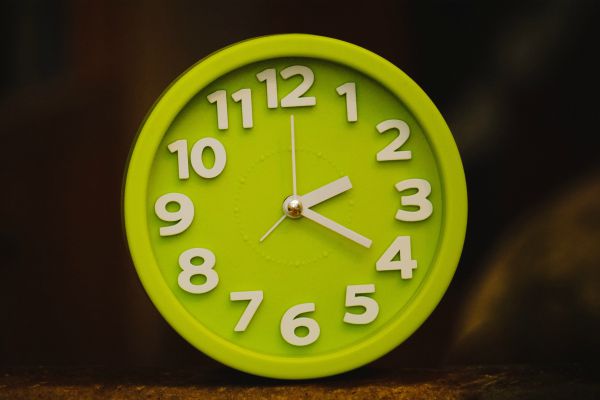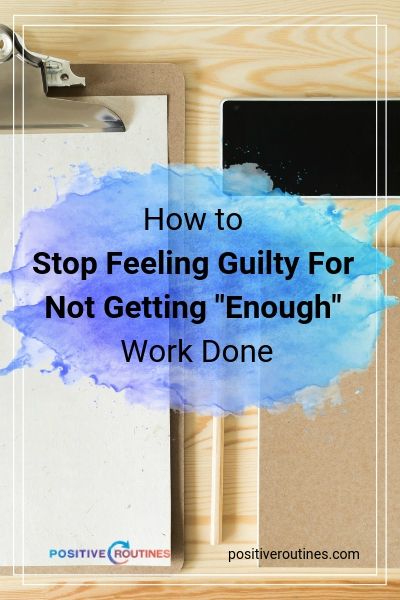If you’re anything like we are, checking a task off of your work to-do list can feel like an Olympic-level success. (And don’t get us started on the relief we feel when we complete our whole to-do list.) But what about the days when you don’t get everything completed — the days when, no matter how hard you try, or how much you hustle, the universe continues to pile responsibilities onto your plate? On those days, leaving the office with unchecked items on your to-do list can leave you feeling guilty, or even ashamed. What then?
Firstly, know two things: 1. You’re not alone and 2. There are ways to push back against the guilt. How do we know that? Because we talked to an expert who knows a thing or two about how to stop feeling guilty in the workplace and in general. Below, we’ll share her tips, along with other insights into work guilt, so you can get rid of the guilt. For real.
How Many of us Experience Work Guilt?

Before we jump into ways to handle work guilt, let’s take a look at how common it really is.
According to an online study, more than 4 in 10 millennials consider themselves “work martyrs,” clocking long hours, making themselves constantly reachable, and feeling guilty if they don’t. Sound familiar?
Other research also shows that one in four Americans feels guilty requesting time away from the office, and one in five people cite guilt as the reason they don’t take regular breaks throughout their week. Altogether, one-quarter of Americans say their job is the number one biggest stressor in their lives.
Why Are so Many of us Feeling Guilty?

Okay, we get it. When it comes to work, we’re feeling guilty at the office, at home, and basically all the time. But that begs the question: Why?
Much of these deep-seated feelings are rooted in the value Americans place on work ethic and the overarching cultural belief that hard work and success are mutually inclusive.
According to a survey from the Pew Research Center, 73 percent of Americans think it is “very important to work hard in order to get ahead in life”, a value that’s notably greater than the rest of the world, which only clocks in at 50 percent. This ultimately encourages Americans to hustle hard on a daily basis.
And the stats speak for themselves. It’s estimated that the average American will spend 90,000 hours at work in their lifetime.
The Effects of Feeling Guilty about Work

We know that a lot of us are putting in long hours in and out of the office. But that’s just the American way, right? Well, yes, but that doesn’t mean we’re not affected by it.
Here are some negative effects of those extended hours:
- Your health takes a hit: Over time, a longer workweek can cause an increased risk of heart disease, generally poor health, and exhaustion. (Bet we didn’t have to point out that last one, did we?) In fact, one study found that “those who work more than 55 hours a week have a 33 percent increased risk of stroke compared with those who work a 35- to 40-hour week”. Overworked employees were also found to have a 13 percent increased risk of coronary heart disease.
- Your productivity tanks: What’s more, increased office hours don’t boost your productivity. More like the opposite. Studies show that working longer hours actually results in diminishing returns. In other words, beyond a certain point, each additional hour you stay at the office becomes less productive than the last.
- Other countries find us absurd: Okay, this isn’t really that crucial. But we found it amusing that European workers think our tendencies to work after hours, eat at our desks, and send weekend emails are ridiculous.
Are There Benefits?

Maybe.
It can, sometimes, be a motivating factor for us to get ahead in our careers. In fact, a paper published by the Journal of Applied Psychology showed that those who experienced work guilt were routinely rated highly in performance reviews and considered more capable leaders than their peers who didn’t.
Feeling guilty can also increase a person’s likelihood of being cooperative.
But even with some of those benefits, feeling guilty on the job isn’t worth it, especially if it’s coming from deeper issues about adequacy. Dr. Mildred Borras, a licensed psychologist practicing in New York, points out, these feelings of guilt are essentially futile. “Guilt should only be [felt] when we have done something morally wrong,” she says.
Dr. Borras goes on to explain that this collective guilt so many Americans experience may actually be more related to shame, or the looming feeling that our work performance isn’t up to par. “The question is to find out what’s under that guilt,” she says.
So how do we do that? If you’re struggling with feelings of not being good enough at your job or in general, it’s best to call in the professionals. Reach out to a counselor or therapist in your area to get started.
4 Ways to Deal with Feeling Guilty at Work

As Dr. Borras suggests, much of the work guilt we’re feeling may actually point to an underlying worry about how we’re stacking up.
Here are a few tips to keep that work guilt in check and make us feel better about our overall performance.
1. Set up regular check-ins with your boss

Some of the guilt you’re feel at the office may be rooted in the feeling you are not performing at the level your boss expects. But by scheduling a regular 1:1 meeting with your boss, you can find out exactly where you stand, rather than spend your days guessing. If your boss tells you that you’re doing a great job, you’ll be able to shoo away feelings of guilt that imply you’re not doing “enough.”
Conversely, if your boss gives you some areas to work on, you’ll leave the meeting with actionable ways to improve your performance, rather than proceeding blindly and simply clocking more hours.
What’s more, regular 1:1 meetings have been shown to produce a 529 percent return on investment. (I.e. they’re good for your employer, too!)
2. Establish an end-of-workday routine

You know we’re big on routines around here. And for good reason — routines can help you curb stress and anxiety.
Research has shown that routines can make our lives feel more meaningful. And one study found evidence that maintaining a daily routine can improve your mental health — and your cognitive functioning.
So how do you apply that to your workday? Place a reminder on your calendar 30 minutes before you need to leave for the day, and then embark on an end-of-day routine to get into the mindset that it’s time to leave soon.
For example, you might: Organize your desk and plan tomorrow’s to-do list. This will help you be prepared for the day ahead and feel like you have a plan to take on the tasks you didn’t finish.
Need help building your best routine? Panda Planner’s got you covered.
3. Make the most out of your schedule

One key way to stop feeling guilty for not accomplishing “enough” is to make your work days run as efficiently as possible. To do this, you may need to reevaluate your daily schedule.
First, try finding black holes in your day. Are there any meetings that suck a lot of time out of your schedule that you don’t actually need to attend? What about the countless hours you spend on email? See if you can condense your meetings or make some of them optional, and work on an email strategy that doesn’t eat up your precious productive hours.
Try to block off time slots to work on urgent and important projects or dedicate chunks of time to similar tasks, like answering those emails. This is called task batching, and it’s a good way to take control of your schedule. If you need help figuring out what’s important and what’s not, the Eisenhower Matrix is a good place to start.
4. Place a hard stop on your calendar

The old adage known as Parkinson’s Law says that “work expands so as to fill the time available for its completion.” In other words, the more time you have to work on a project, the longer it will take you to complete it.
When you don’t have a particular time you need to leave the office on a given day, you may be less likely to finish a particular task more quickly. Now what?
Try placing a hard stop on your calendar for the end of each day, so that your brain acknowledges the small window of time you have to finish a task. This can help you work more quickly and efficiently to complete it before you leave.
To sum it all up…

Overall, Dr. Borras emphasizes that “it is important to encourage ourselves” rather than be critical of our efforts. Feeling guilty, and guilt in general, is all about emotion and it shouldn’t influence our decision-making at the office, she says.
By setting up regular check-ins with your boss, maximizing your calendar, and creating an end-of-day routine, you can give yourself permission to feel good about what you have accomplished — and less guilty about what you haven’t.
Your turn: When you find yourself feeling guilty about work, what do you do to cope? Tell us your work-guilt relief strategies in the comments below.
How much does chance have to do with hitting your goals? Find out more about the relationship between success and luck here.

Author: Jennifer Lance
Jennifer Lance is a writer living in New York City. A former editor at Glamour, she’s written about everything from the Oscars to Marie Kondo-ing her love life. Her pastimes include watching The Bachelor, filing her taxes at the 11th hour, long walks on the beach and also short walks to her neighborhood Dunkin’.

Let Us Know What You Think